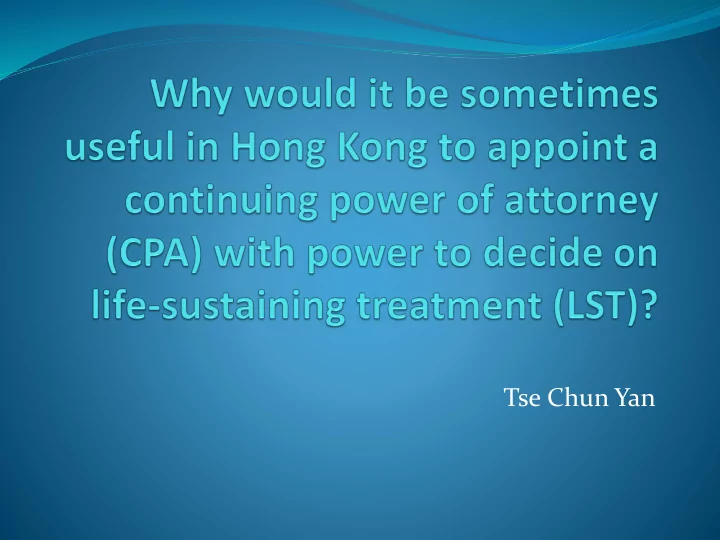

Tse Chun Yan
Outline Brief introduction Review 2 journal articles Brief discussion
In Hong Kong, for a mentally incompetent patient Decision on medical treatment normally made by consensus building between the healthcare team and the family members in the best interests of the patient. Consensus building is sometimes not easy. A valid and applicable advance decision refusing life-sustaining treatment (usually called an advance directive AD in Hong Kong) has legal status, and must be respected. Helps to reduce difficulties in decision-making.
To clarify terminology In other countries, advance directives may include: Advance decision refusing treatment Called “living will” in many countries. Appointing a healthcare proxy CPA for healthcare is one form of healthcare proxy. In Hong Kong, because a healthcare proxy currently has no legal status, an AD is an “advance decision refusing treatment” (a “living will”).
To reduce difficulties in end-of-life decision-making Some would consider that signing an advance decision refusing treatment would be adequate to reduce difficulties in end-of-life decision-making. Why bother to appoint a CPA with power to decide on LST?
Hastings Centre Report 2004, 34(2): 30-42.
Authors Angela Fagerlin Co-Director of the Center for Bioethics and Social Sciences in Medicine and Professor of Medicine at University of Michigan Carl E. Schneider Chauncey Stillman Professor for Ethics, Morality, and the Practice of Law and Professor of Internal Medicine at University of Michigan
Discussion paper with over 100 references Key points: The policy to widely promote living wills has not produced results and should be abandoned (main theme of the paper). Not against the use of living wills in special situations. Prefers promoting durable power of attorney.
Why living wills fail Few people sign living wills despite wide promotion: Quoted a figure of 18%. People have difficulty in knowing what they will want: “An unspecifiable future confronted with unidentifiable maladies with unpredictable treatments”, Compared to the rising standard for informed consent, living wills are made without adequate information and without adequate analysis, People change their mind.
Why living wills fail People have difficulty to articulate what they want: Idea muddled in their mind People have difficulty to write down in their own words the complex instructions Standard forms are either too general or have too specific questions. The healthcare team are not aware of the existence of a living will: 26% of medical records accurately record information about the directives.
Why living wills fail Interpreters cannot analyze the AD instruction accurately: Quoted one randomized control trial showing that the availability of a scenario-based or value-based AD does not help the predictability of patient preferences in other scenarios. Living wills do not alter patient care: Contents of AD were vague and difficult to apply to current situation Difficulty to say whether the patient is terminally ill or “absolutely, hopelessly ill” Objection by family members
The cost of programs to promote living wills The cost plainly outweighs the benefits, because the “programs have failed”. The policy should be abandoned.
Not against the use of living wills in special situations, when The medical situation is plain The crisis is imminent The preferences are specific, strong, and delineable Have special reason to prescribe their care
Prefers to promote durable power of attorney The choices that powers of attorney demand of patients are relatively few, familiar, and simple. A regime of powers of attorney requires little change from current practice, in which family members ordinarily act informally for incompetent patients. Powers of attorney probably improve decisions for patients, since surrogates know more at the time of the decision than patients can know in advance.
Prefers to promote durable power of attorney Powers of attorney are cheap; they require only a simple form easily filled out with little advice. Can be supplemented by legislation akin to statutes of intestacy Statutes to specify who is to act for incompetent patients who have not specified a surrogate.
Quick comments on the paper Emotive language was sometimes used. Discussion was sometimes biased. However, the views raised are worthy of serious reflection.
Journal of Pain and Symptom Management 2013, 46 (3): 355-365.
Qualitative study Participants: patients and surrogates with experience of making serious medical decisions: Patients: for themselves, Surrogates: for others. Semi-structured focus groups, asking what activities best prepared the participants for decision making. Thematic content analysis.
Themes identified Use of advance directives alone is not sufficient: Scenarios in AD are hypothetical Decisions needed to be made are more than those specified in the AD Identifying values based on past experiences and quality of life: Use past experience and consider worst case scenarios Focus on quality of life defined individually Reevaluate over time
Themes identified Choosing a surrogate and verifying their understanding: Choice based on ability May change over time Need to prepare surrogate Considering whether to grant surrogates leeway: Patients want to grant leeway to surrogates, allowing surrogates to be an advocate and to make best in- the-moment decisions, though understanding that leeway is not always prudent.
Themes identified Informing family and friends about one’s wishes: To prevent conflict To provide control for the patient and the surrogate
Overall discussion Advance decisions refusing treatment may not be adequate or appropriate to cover all scenarios in end- of-life decision-making. In-the-moment decisions are important: Need to prepare the decision-makers. Prior expression of values and preferences and prior discussion with family members would be helpful. Importance of ACP to involve family members and to discuss values and preferences.
Overall discussion If there is worry about conflicts among family members, it will be useful to delegate such a decision to someone he/she trusts, and who understands the values and treatment preferences of the patient. Thus, it is sometimes useful in Hong Kong to appoint a CPA with power to decide on life-sustaining treatment.
Thank you!
Recommend
More recommend